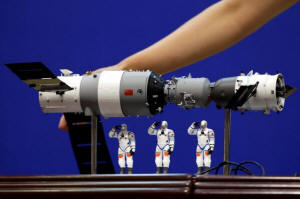|
The
craft is expected to re-enter Earth's atmosphere at some time
from this week, according to China's manned space program, but
no one knows for sure where.
Speaking at a daily news briefing, foreign ministry spokesman Lu
Kang said the government had been continually informing the U.N.
space agency of the latest information about the Tiangong-1.
China had been responsible and transparent, Lu said.
"If there is a need, we will promptly be in touch with the
relevant country," he said.
"As to what I have heard, at present the chances of large
fragments falling to the ground are not very great, the
probability is extremely small."
The 10.4-metre-long (34.1-foot) Tiangong-1, or "Heavenly Palace
1", China's first space lab, was launched into orbit in 2011 to
carry out docking and orbit experiments as part of China's
ambitious space program, which aims to place a permanent station
in orbit by 2023.
It was originally set to be decommissioned in 2013 but China has
repeatedly extended its mission, leading some scientists to
believe that it has gone out of control.
Advancing China's space program is a priority for President Xi
Jinping, who has called for Beijing to become a global space
power with both advanced civilian space flight and capabilities
that strengthen national security.
(Reporting by Ben Blanchard; Editing by Robert Birsel)
[© 2018 Thomson Reuters. All rights
reserved.] Copyright 2018 Reuters. All rights reserved. This material may not be published,
broadcast, rewritten or redistributed.
Thompson Reuters is solely responsible for this content.

|
|







